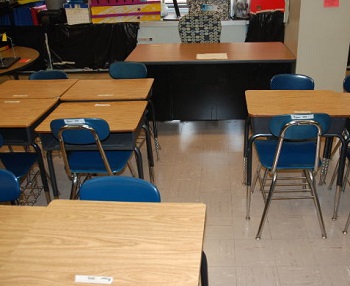The VR tech for students will be expanding by 15 additional cities through the Expeditions Pioneer Program.
Google has recently announced that it will be broadening the reach of its Expeditions Pioneer program, which means that it will be sending its virtual reality kits to schools in a larger number of cities around the world.
The idea is to provide students with a new and fascinating VR based learning experience in the classroom.
Google explained that the program is meant specifically for providing virtual reality within the class environment. In order to create its over 100 different VR journeys, the company’s developers worked alongside teachers and other content partners from across the globe, “making it easy to immerse students in entirely new experiences.” Alongside this announcement, Google has also stated that it will be providing the technology to 15 new cities, some of which are in international marketplaces.
That said, Google did not immediately identify exactly how many schools would be receiving the virtual reality kits.
 Across the United States, the cities that are expected to receive the VR technology kits include New Orleans, Las Vegas, Detroit, Baltimore, Orlando, Cincinnati, Alexandria, Phoenix, Indianapolis, Washington D.C., Salt Lake City and Portland. The countries into which this technology news will be taking steps includes Canada (Toronto), Singapore and Denmark. An unknown number of schools within those cities will be receiving the technology kits through the program.
Across the United States, the cities that are expected to receive the VR technology kits include New Orleans, Las Vegas, Detroit, Baltimore, Orlando, Cincinnati, Alexandria, Phoenix, Indianapolis, Washington D.C., Salt Lake City and Portland. The countries into which this technology news will be taking steps includes Canada (Toronto), Singapore and Denmark. An unknown number of schools within those cities will be receiving the technology kits through the program.
The Google Expedition kit will be expanding through a partnership with Subaru and will include a tablet for the teachers of participating classes, ASUS smartphones as well as a router and the viewers that will convert the phones into VR devices similar to Google Cardboard.
The Expeditions program has not actually been around for very long since its initial launch, so it is quite interesting and potentially promising to see the speed at which Google has been broadening its reach. Many are interpreting the decision to add 15 new cities to the virtual reality program as an indicator that things have been going well in the cities that were involved in the first waves following the initial launch.
This mobile health tool helps people to be able to confront their anxieties and their fears.
A new self-help tool has now been developed by a team of psychologists, physicists, and developers, which uses augmented reality over a mobile health platform, with the goal of helping users to be able to treat their phobias and overcome their anxieties.
The Phobious mobile app is a part of the overall DreamIt Health Baltimore’s inaugural class.
The team came up with tools that can be used over a smartphone, and the consumer product – which includes both a mobile app that will work on Android or iPhone, and a pair of augmented reality goggles – will be launched in September. Baltimore came upon the Phobious mhealth technology via Barcelona.
This augmented reality technology will include both a consumer facing tool and tracking for doctors.
This allows the program to be used both as a self-help tool as well as a way for clinicians to be able to track the progress of their patients. That second element is still under development. That said, the consumer facing platform is well under way. The primary focus of that element will be specifically on phobias, ranging from spiders and insects to needles and even public speaking.
The intention of the company is to market it as a self help tool, but without any promises or guarantees that it can be used as a cure in treating these extreme fears. That said, it does have every intention to pursue FDA clearance in the United States, as well as a CE Mark from regulators in the E.U. This will allow it to be sold as a device that can help to treat issues related to anxiety disorders and post traumatic stress disorders (PTSDs).
Previous research form the military has shown that virtual reality has been able to generate some success when treating these types of conditions.
Dani Roig, the co-founder of Phobious, is one of the company’s two physicists who has been struggling with a fear of flying. He explained that companies attempting to come up with tools based on virtual reality has typically proven to be too expensive and challenging for broadscale adoption. However, in the form of an mhealth tool using augmented reality, the product becomes much more affordable and achievable.
 Across the United States, the cities that are expected to receive the VR technology kits include New Orleans, Las Vegas, Detroit, Baltimore, Orlando, Cincinnati, Alexandria, Phoenix, Indianapolis, Washington D.C., Salt Lake City and Portland. The countries into which this technology news will be taking steps includes Canada (Toronto), Singapore and Denmark. An unknown number of schools within those cities will be receiving the technology kits through the program.
Across the United States, the cities that are expected to receive the VR technology kits include New Orleans, Las Vegas, Detroit, Baltimore, Orlando, Cincinnati, Alexandria, Phoenix, Indianapolis, Washington D.C., Salt Lake City and Portland. The countries into which this technology news will be taking steps includes Canada (Toronto), Singapore and Denmark. An unknown number of schools within those cities will be receiving the technology kits through the program.

